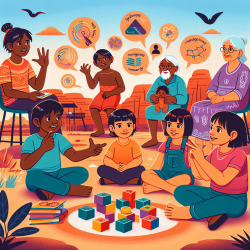The research article "Delivering Elder- and Community-Led Aboriginal Early Childhood Development Research: Lessons from the Ngulluk Koolunga Ngulluk Koort Project" offers profound insights for practitioners in the field of speech-language pathology. This project emphasizes the importance of elder- and community-led methodologies in addressing early childhood development within Aboriginal communities. Here, we discuss key findings and their practical applications to improve outcomes for Aboriginal children.
Understanding Cultural Context
The Ngulluk Koolunga Ngulluk Koort (Our Children, Our Heart) project underscores the necessity of integrating Aboriginal worldviews into early childhood development research. The project's participatory action research methodology ensures that the research is culturally appropriate and grounded in the lived experiences and values of Aboriginal people.
Key Findings and Practical Applications
- Community Engagement: The project highlights the significance of involving Aboriginal Elders and community members in the research process. Practitioners should actively engage with community leaders to co-design interventions and ensure they are culturally relevant.
- Holistic Approach: Aboriginal worldviews emphasize the interconnectedness of health, culture, and spirituality. Practitioners should adopt a holistic approach that considers these elements when working with Aboriginal children and their families.
- Building Trust: Establishing trust with the community is crucial. This involves long-term commitment, transparency, and respect for Aboriginal knowledge systems. Practitioners should prioritize relationship-building and be patient with the process.
- Strengths-Based Perspective: The project advocates for a strengths-based approach, recognizing the inherent strengths and resilience within Aboriginal communities. Practitioners should focus on empowering families and building on their existing capabilities.
Encouraging Further Research
The findings from the Ngulluk Koolunga Ngulluk Koort project highlight the need for more research that is led by and for Aboriginal communities. Practitioners are encouraged to engage in or support research that respects and incorporates Aboriginal worldviews, ensuring that the research outcomes are beneficial and empowering for the community.
Conclusion
Implementing the lessons from the Ngulluk Koolunga Ngulluk Koort project can significantly enhance the effectiveness of early childhood development interventions for Aboriginal children. By adopting a culturally informed, community-led approach, practitioners can contribute to closing the gap in life outcomes between Aboriginal and non-Aboriginal Australians.
To read the original research paper, please follow this link: Delivering Elder- and Community-Led Aboriginal Early Childhood Development Research: Lessons from the Ngulluk Koolunga Ngulluk Koort Project.










